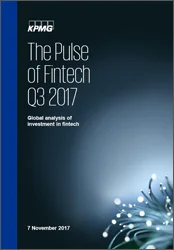BY Fraser Tennant
Investment in FinTech reached $8.2bn across 274 deals in Q3 2017, with venture capital (VC) funding strong and deals large, according to KPMG’s latest quarterly analysis of global trends.
In ‘Pulse of Fintech Q3 2017’, KPMG reveals that the US led global FinTech investment in Q3 2017, with $5bn deployed across 142 deals (VC funding increased to $3.3bn across 211 deals, up from $3.01bn in Q2). In Europe, FinTech deals accounted for $1.66bn of investment across 73 deals, while Asia saw $1.21bn invested across 41 deals (VC funding was particularly strong in Europe in Q3 at over $700m).
Additional Q3 2017 FinTech highlights include: (i) the median deal size for angel/seed stage deals at the end of Q3 2017 stood at $1.4m, up from $1m in 2016, while the median deal size for early stage rounds was also up to $5.5m from $5.1m in 2016; (ii) the median deal size of late stage deals was even year-over-year at $16m; (iii) while overall corporate VC funding has declined so far this year, the participation rate remains high (corporates have participated in 18 percent of all FinTech VC deals globally, year-to-date); and (iv) FinTech venture-backed exit activity skyrocketed in Q3 2017, almost tripling quarter-over-quarter from $270m to $940m. This reflects the second-best quarter on record for FinTech exits.
Furthermore, the top 10 global deals in Q3 2017 included six US companies. These were Intacct ($850m), CardConnect ($750m), Xactly ($564m), Merchants’ Choice Payments solutions ($470m), Access Point Financial ($350m) and Service Finance Company ($304m). The remaining four were Germany-based Concardis ($806m), UK-based Prodigy Finance ($240m), Canada-based TIO Networks ($238.9m) and China-based Dianrong ($220m).
“The level of corporate participation in FinTech VC investment deals in Europe can largely be attributed to a growing recognition by traditional financial institutions that digital transformation is critical,” said Anna Scally, a partner, head of technology and media and FinTech lead at KPMG. “Build or buy is always an important consideration. Many of these financial institutions have started to heavily invest in FinTech companies as a strategy to give them the direct access to the new technologies they need to compete."
Looking ahead, the KPMG report notes that the FinTech sector is expected to continue to evolve rapidly, with many companies, including both mature FinTechs and large e-commerce players, looking to diversify into adjacent services.
Report: Pulse of Fintech Q3 2017 - Global analysis of investment in fintech


